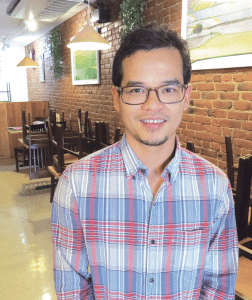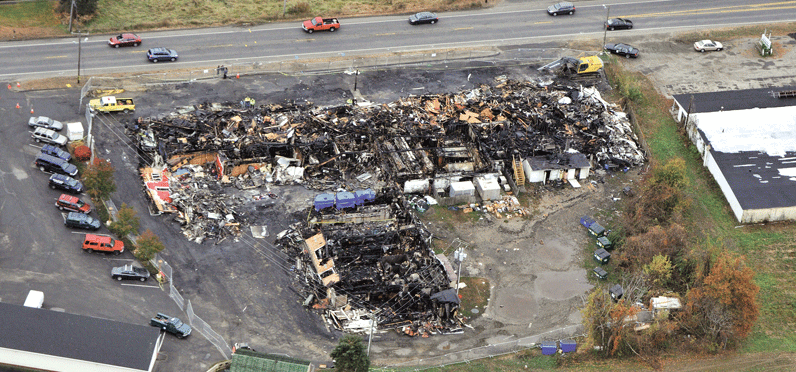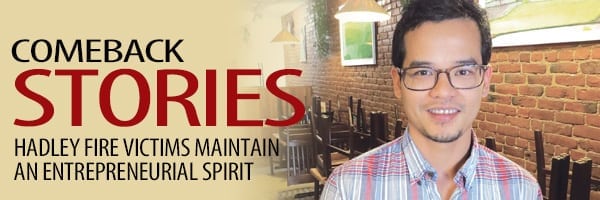
Comeback Stories
Hadley Fire Victims Maintain an Entrepreneurial Spirit
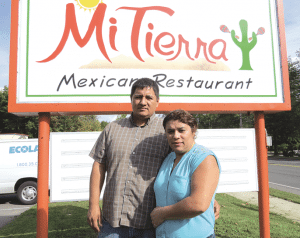
Chuong Son, left, and Jorge Sosa and his wife, Dora Saravia, are among those who have overcome myriad challenges and gotten back in business.
The first was an intense fear that he might have been the one responsible for this conflagration that lit up the night sky and displaced a dozen small businesses.
“I remember it like it was yesterday. A friend of mine called me … he was driving down the road and said, ‘there’s smoke coming from where your store is at the back of the building; did you leave something on?’” said Son, who emigrated to this country in 1989 from Vietnam. “We got scared and nervous and made the drive right down there.”
Later, he would learn, from one of the firefighters who responded to the blaze, that the prevailing theory was that it started in the laundromat located within the mall, news that brought a sense of relief, to be replaced later by a feeling of relative calm rooted in the belief that his business was insured for $1 million.
This was followed by disappointment and anxiety, however, when he was informed that his insurance involved two fewer zeros. And over the next 10 months, there would be gratitude, frustration, resolve, and finally pride and controlled euphoria as he reopened Banh Mi Saigon, a Vietnamese sandwich shop he operates with his wife, Mung Pham, on Main Street in Northampton.
The emotions Son felt during his long climb back were common among the other business owners victimized by the blaze — especially the frustration and resolve.
The former resulted from fights with insurance companies over coverage and, especially, large amounts of confusion and misinformation that characterized attempts to secure support and loans from agencies such as the Small Business Administration. And the latter defined the efforts to overcome all that and get back in business.Not all of them have made a full recovery, but as the anniversary of the Oct. 27 blaze approaches, one of the many themes of this multi-tiered story has been the ability of several business owners to overcome various forms of adversity and continue to demonstrate a strong entrepreneurial spirit.
Consider the case of Jorge Sosa and his wife, Dora Saravia, owners of Mi Tierra, a popular Mexican restaurant leveled by the blaze. After struggling through a period when simply paying his mortgage and the loan on a box truck he had recently purchased for his business became a stern challenge, Sosa secured a loan from the Samuel Adams Brewing the American Dream program, in conjunction with Common Capital. He used that money to acquire a $54,000 tortilla-making machine and become a partner in a Springfield-based venture called Estelita’s Taqueria, which supplies tortillas to a number of local clients.
Meanwhile, thanks in large part to the cash flow created by that venture, he is ready to reopen Mi Tierra on the site of a former Japanese restaurant further west on Route 9. As he talked with BusinessWest about the past 12 months — as well as what lies ahead — he was putting some finishing touches on the new eatery with the goal of making a statement by opening one year after the tragedy.
“It’s been a long nightmare,” he said, using that word for the first of many times. “It’s been very difficult for many of us to make it back. But here we are.”
Three other businesses destroyed in the fire — a bakery, a dry cleaner, and a karate studio — have reopened almost across the street in the former Registry of Motor Vehicles plaza, while for others, the recovery is still a work in progress.
Overall, it’s been a trying ordeal and a learning experience, not only for the business owners, but for the agencies that have provided various forms of assistance.
Len Gendron, chairman of the Western Mass. chapter of SCORE (the Service Corps of Retired Executives), said that agency, which eventually provided assistance to several of the displaced business owners, will likely be more proactive the next time such a crisis occurs.
“Ordinarily, we don’t go straight to the victims in such cases — we do solicit, but we don’t go out and touch them,” he explained, adding that things changed when a news accounts indicated that, nine months after the fire, many business owners were having problems getting any real assistance.
“We reacted to that, approached the victims, and said, ‘how can we help?’” he went on, adding that SCORE set up meetings with the SBA and local banks and later assigned mentors to those who attended the meeting. “This was a good experience, and it opened our eyes to what these disaster victims go through, and we’ve decided, as a chapter, that, should we get another business disaster like this, we’re going to step up very early and offer our assistance.”
From the Ground Up
Like Son, Sosa is able to recall many moments, and emotions, both during that fateful night and then over the next several months.
He remembers being at work that evening when one of the bartenders on duty alerted him to “some kind of fire on the roof.”
He recalls going outside to investigate and seeing nothing emanating from his kitchen. He went back inside, saw growing amounts of smoke, and directed patrons to leave. He stayed, with the goal of finding out what had happened — but for too long.
“I started to get scared — the smoke was starting to get really, really thick,” he noted. “I was trying to see where the fire was coming from and if there was any way to stop it; the police started screaming, ‘get out,’ and that’s when I realized I couldn’t breathe anymore and just got out.”
He also recalled a question from his 8-year-old daughter a few days later. “She said, ‘are we going to lose our house because we don’t have a job?’” he told BusinessWest, adding that while he gave a resounding ‘no,’ deep down, he wasn’t entirely sure.
Such sentiments help explain that, while the fire was a fast-moving conflagration that started near the middle of the strip mall and worked its way to both ends, devouring everything in its path, this was in many ways a slow-moving ordeal that tested the patience, and the will, of those involved.
Son remembers help coming from many directions — from monetary donations collected and distributed by the Amherst Area Chamber of Commerce soon after the fire, to assistance from representatives of U.S. Rep. Jim McGovern’s office, to direct support from Common Capital and SCORE more recently. And he was grateful for all of it.
“We come from a place where people are very reserved; culturally and traditionally, people keep to themselves and don’t open up in terms of receiving help from the public,” he explained. “Going through this situation, we found out that there were people who didn’t even know us but took the time to send encouraging e-mails and donate their hard-earned money to help us rebuild.
“People came out of nowhere and said, ‘how can we help you?’” he went on. “Coming from where we’re from, it’s difficult to open up to receive that help, so just the initiative from all these people saying ‘we can help you’ helped us in terms of being more open. We did all that we could to reopen just because of strangers who helped us out.”
But while there was support from the community and many agencies, there were also large amounts of confusion, miscommunication, and, as it would turn out, misinformation, that would frustrate and delay comeback efforts.
Gendron told BusinessWest that many problems were related to SBA loans, who was eligible for them, and what they could be used for.
“The real problem wasn’t a lack of information, because there was a lot of it being provided, but it was conflicting information,” he explained. “These folks were reaching out to everybody, and everybody told them something different.”
Elaborating, he said the governor had declared the area an economic disaster, but his administration didn’t fully explain that this designation, and the support it creates in the form of loans, is not related to rebuilding, as most fire victims assumed, but for paying bills that were due at the time of the disaster and for carrying forward.
“The victims started calling around and even reached an SBA representative down south, who basically told them they weren’t qualified, which was true — they weren’t qualified for rebuild loans. They started reaching out to absolutely everybody, and everybody had a different answer. It got totally confused, and they didn’t get the information they needed.”
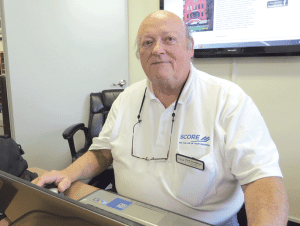
Len Gendron says the fire and its aftermath have provided a learning experience on many levels — for the victims, but also for the agencies that worked to help them.
“They had more affordable rents for a prime location like that than you would find in downtown Northampton or downtown Amherst,” said Dan Crowley, who covers Hadley and some other towns for the Daily Hampshire Gazette. “To recreate that tenant/property-owner relationship from scratch somewhere else was going to be difficult — it was going to be more expensive for them.
“And a lot of them really liked being where they were, in the center of Hadley,” he went on. “In listening to them, I got the impression that this was working for them and appealing to them. And some of them had been there a long time — they had established clienteles and relationships with customers that develop over 10, 15, or 20 years.”
It was one of Crowley’s stories recounting the challenges and frustrations of the victims that caught the attention of those at SCORE, which later scheduled meetings, assigned mentors, and helped link victims with needed support from banks and agencies such as Common Capital.
Recovery Mission
Sosa told BusinessWest that the fire occurred at a time when things were really coming together for Mi Tierra.
The couple had recently purchased tortilla-making equipment and was supplying them to a steadily growing list of clients. Meanwhile, the restaurant and its recently opened bar were drawing a steam of regular and new customers.
Things all changed in a matter of those few chaotic minutes when he realized the building was on fire.
And if there was chaos that night, there would be more in the months to come, as the couple would wrangle with insurance providers and struggle to get their various business operations back up and running.
“It’s been a long, very difficult year,” said Sosa, adding that the financial support from Common Capital and the Samuel Adams Brewing the American Dream program have been instrumental in creating needed cash flow, momentum, and resolve to reopen Mi Tierra.
He acknowledged that there is a good amount of risk with this new venture — the footprint is much larger and the rent considerably higher than what they were paying — but he believes it is worth taking on.
“People have supported us over the years, and we believe they will continue to support us here,” he said. “We can offer a lot to our clients. It’s going to be difficult, but we can make this work.”
Son used similar language to describe his comeback. He told BusinessWest that, while the fight to get back on his feet has been long and difficult, he drew needed inspiration from the many forms of support he has received, and has been driven by his desire to be in business for himself.
He arrived in Amherst after a long, twisting journey that took him from Vietnam to Thailand and then Camden, N.J. He worked for many years in the food-services operation at UMass Amherst, but long desired to start his own venture. Realizing that there were no Vietnamese restaurants in the region at the time, and sensing there was a need for one, he opened Banh Mi Saigon, complete with just 20 seats, in the Norwottuck shops in 2012.
It took some time to build a clientele, primarily because few were familiar with Vietnamese food and the company had little, if any, money for advertising. Slowly but surely, however, the venture established a firm footing.
As he watched the fire quickly consume the wood-framed strip mall, Son knew he would soon have to start over. But little did he know how difficult that would be.
“We thought we were covered for $1 million, so we went to sleep saying to ourselves, ‘I think we’ll be all right; we can rebuild easily with $1 million,’” he told BusinessWest. “But then we called the insurance company and found out we were only covered for $10,000, and it took all our savings, $100,000, to build the place.
“We didn’t know what to do or who to ask for help, and we didn’t think we could do it again because we didn’t have the capital,” he went on, adding that, through the help of SCORE and his mentor, Dan Healy, he was able to secure a $50,000 loan from Common Capital, the Holyoke-based nonprofit loan fund, to relaunch Banh Mi Saigon.
After the fire, Son originally desired to stay in Hadley, but he eventually set his sights on the Northampton location — the former home, ironically enough, to a failed Vietnamese restaurant — because he thought that made more sense and offered more potential to help him grow the venture.
He said business was slow at the start (he ropened in late August), but it has picked up via word of mouth and repeat business. (He is closed Mondays, the day BusinessWest visited, but several people came to the door in the belief that he might be open).
He is optimistic, but also realistic, and understands that he must drive more volume to his venture if he is going to pay rent that is roughly five times higher than what it was in the Norwottuck Shoppes.
The Bottom Line
Summing things up for his family — and no doubt all the others impacted by the fire — Sosa again reached for the word ‘nightmare,’ but quickly added that it’s been one with countless instances of people, often perfect strangers, reaching out to help the victims of this tragedy realize new dreams.
“We’ve gone through every emotion,” he said. “Many times we cried because of our situation, and many times we cried out of happiness for what friends had done for us.”
And a full year later, with their business once again open, they will likely cry again.
George O’Brien can be reached at [email protected]



